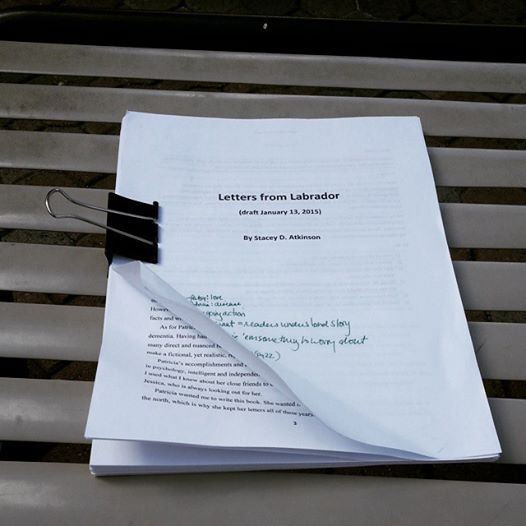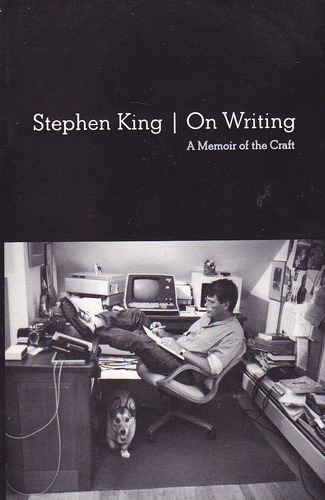Stacey D. Atkinson's Blog, page 2
August 31, 2015
Highlights of indie publishing news in August 2015
From Pinterest to dialogue tags to author press kits to picking the perfect book title, this month's indie author news is full of really helpful tips for new and experienced self-published authors. Here is my curated list of the top news stories, industry buzz, and advice for indie authors that I found in August and shared via my Twitter and Facebook feeds.
How Pinterest Can Work for Publishers by Charlotte Eyre on thebookseller.com
Let Your Dialogue Do the Talking by Jocelyn Pruemer on blog.bookbaby.com
The Author's Press Kit by Richard Ridley for Createspace.com
Why You Need Professional Editing for Your Novel by Jim Dempsey for blog.bookbaby.com
The Dreaded Comparative Title Analysis by Jesse Finkelstein for blog.bookbaby.com
Bonus...
Bookish Hedgehogs of Instagram by Becky Stone for bookriot.com

"Scooter is enjoying an idyllic bookish picnic with a beautiful hardcover and scenic view." -- Bookriot.
More Scooter images can be found on his Instagram account @scooter_the_hedgie.
Stacey D. Atkinson is a freelance editor and author of Stuc k , a novel she published via her independent company Mirror Image Publishing.
August 18, 2015
Highlights of indie publishing news in July 2015
I feel like I'm in a time warp. Days and months are flying by in the blink of an eye (hey, that rhymes), and I haven't published a new blog post in what seems like forever! So to quickly get back on top of things, I am going to share with you my curated list of the top news stories, industry buzz, and advice for indie authors that I found last month and shared via my Twitter and Facebook feeds.
15 Successful Entrepreneurs Share the Most Important Lessons They Learned in Their 20s, by Richard Feloni for the FinancialPost.com
Judging a Book by Its Cover: What Book Publicists--and Media--Want to See on the Outside of a Book, by Sandra Poirier Smith for BookBaby.com
E-Books Get a Makeover: Amazon and Google are rolling out new fonts designed not only to look better on screen but to make reading easier on the eye, by Jennifer Maloney for WSJ.com
Musicians Have Taylor Swift. Who's Championing Fairness for Writers?, by Lorraine Devon Wilke for HuffingtonPost.com
Will Book Publishers Ever Start Fact-checking?, by Boris Kachka for Vulture.com
AuthorBuzz Founder M.J. Rose's Best Practices for Marketing, by Edward Nowatka for Publishing Perspectives
And a bonus article that is so very pleasing to the eyes:
Book Art Is Awesome: Folded Edition, by Nikki Steele on BookRiot.com
Stacey D. Atkinson is a freelance editor and author of Stuc k , a novel she published via her independent company Mirror Image Publishing.
Top news for indie publishing in July 2015
I feel like I'm in a time warp. Days and months are flying by in the blink of an eye (hey, that rhymes), and I haven't published a new blog post in what seems like forever! So to quickly get back on top of things, I am going to share with you my curated list of the top news stories, industry buzz, and advice for indie authors that I found last month and shared via my Twitter and Facebook feeds.
15 Successful Entrepreneurs Share the Most Important Lessons They Learned in Their 20s, by Richard Feloni for the FinancialPost.com
Judging a Book by Its Cover: What Book Publicists--and Media--Want to See on the Outside of a Book, by Sandra Poirier Smith for BookBaby.com
E-Books Get a Makeover: Amazon and Google are rolling out new fonts designed not only to look better on screen but to make reading easier on the eye, by Jennifer Maloney for WSJ.com
Musicians Have Taylor Swift. Who's Championing Fairness for Writers?, by Lorraine Devon Wilke for HuffingtonPost.com
Will Book Publishers Ever Start Fact-checking?, by Boris Kachka for Vulture.com
AuthorBuzz Founder M.J. Rose's Best Practices for Marketing, by Edward Nowatka for Publishing Perspectives
And a bonus article that is so very pleasing to the eyes:
Book Art Is Awesome: Folded Edition, by Nikki Steele on BookRiot.com
Stacey D. Atkinson is a freelance editor and author of Stuc k , a novel she published via her independent company Mirror Image Publishing.
May 26, 2015
Ten ways to not finish writing your novel
Here I am, two years later, still working on a draft of my second novel. In order to commemorate all that I’ve learned during this extraordinary run of procrastination, I will pass on this great wisdom to you through a top ten list of how not to finish writing your book.

10. You practice the art of deflection by saying yes to everything and everyone who needs you, especially if it creates an overloaded work schedule and after-hours volunteer work.
9. You feel guilty for hibernating every weekend with your computer so you plan a big family dinner.
8. You watch a new episode season of Mad Men on Netflix.
7. You call your mom, your sister, and your best friend and make plans for the weekend.
6. You go shopping, get a haircut, and then stop at the Cupcake Lounge for dessert.
5. You incessantly watch the social media indicators light up on your phone and check the phone each time this happens.
4. You pet the cat until it lulls you into taking a nap.
3. You clean the house and then start that basement reno project that you’ve always been talking about.
2. You doubt your words and scrap your first draft.
1. You decide that in order to be a better writer, you need to re-educate yourself in the classics, so you start reading Anna Karenina.
See, you're not alone. As they say, slow and stead wins the race, so keep writing!
Stacey D. Atkinson is a freelance editor and author of
Stuc
k
, a novel she published via her independent company Mirror Image Publishing.
Ten ways of how not to finish writing your novel
Here I am, two years later, still working on a draft of my second novel. In order to commemorate all that I’ve learned during this extraordinary run of procrastination, I will pass on this great wisdom to you through a top ten list of how not to finish writing your book.

10. You practice the art of deflection by saying yes to everything and everyone who needs you, especially if it creates an overloaded work schedule and after-hours volunteer work.
9. You feel guilty for hibernating every weekend with your computer so you plan a big family dinner.
8. You watch a new episode season of Mad Men on Netflix.
7. You call your mom, your sister, and your best friend and make plans for the weekend.
6. You go shopping, get a haircut, and then stop at the Cupcake Lounge for dessert.
5. You incessantly watch the social media indicators light up on your phone and check the phone each time this happens.
4. You pet the cat until it lulls you into taking a nap.
3. You clean the house and then start that basement reno project that you’ve always been talking about.
2. You doubt your words and scrap your first draft.
1. You decide that in order to be a better writer, you need to re-educate yourself in the classics, so you start reading Anna Karenina.
See, you're not alone. As they say, slow and stead wins the race, so keep writing!
Stacey D. Atkinson is a freelance editor and author of
Stuc
k
, a novel she published via her independent company Mirror Image Publishing.
April 26, 2015
Break time
Sometimes our pets are better at taking breaks than we are.

March 27, 2015
Handy online tools for writers and editors
What a great feeling to look over at your bookshelf and admire all those shiny-covered books: a dictionary, a thesaurus, a few style manuals, and a grammar guide. Such a proud display of literary tools. But have you ever found yourself being a tad lazy and not wanting to actually get out of your chair, go over to the bookshelf, and pick up that heavy hardcover dictionary just to check the hyphenation rule on one crummy little word? Don’t get me wrong—as a writer and an editor, I love my resource books, and there is definitely a time and a place for them. But I also think there is value in online tools. Perhaps the best of both worlds is needed: a mix of traditional ways (books) and new ways (online subscriptions) of working.
As long as we keep needing to look up the difference between effect and affect, or restrictive and nonrestrictive clauses, then we will keep needing our spelling, grammar, and style guides at our fingertips. So, here are some great online tools that will help you build your online resource library.
Chicago Manual of Style Online
$35/year
This is one of the most popular style guides around, and it answers all kinds of questions about grammar, punctuation, spelling, and style. It has an easy search function so you can find what you are looking for within seconds of typing in your keyword, which makes scouring a table of contents or index unnecessary.
Merriam-Webster Unabridged
$29.95/year
This is the largest American dictionary currently available, and it includes author quotations and French-English and Spanish-English dictionaries. It has an easy-to-use search function that brings up all possible results, including how to use the word you are looking for (and spelling variations) as a noun, adjective, adverb, verb, etc. And of course, if you don’t mind ads, you can always use the free version.
Google Translate
Free
Do you ever find yourself needing to look up the spelling of a French or Spanish word? Google Translate is a great tool to quickly check foreign words or phrases. And if you have a Gmail account and you're logged in with your Google Chrome browser, you can easily access this translating tool by clicking on the Google drop-down menu on the top right-hand corner of your screen (click on the dotted square icon and then click “more” at the bottom of the box).
The Language Portal of Canada
Free
This government website showcases Canadian expertise in language. It includes access to Termium Plus, the Government of Canada’s terminology and linguistic bank with over four million English, French, and Spanish terms; as well as the Gateway to English, a search engine of sixteen writing tools, hundreds of language articles, quizzes, and much more.
Writer’s Market
$5.99/month or $39.99/year
Take advantage of this online database to find ways to make a career out of writing. You can search listings for freelance writing gigs, writing contests, literary agents and publishers, and more.
Oxford Dictionaries online
Free
If you have a need to check UK English spelling (with an option for US English), and if you don't mind ads, then this handy online dictionary can be quite useful for a quick search.
And as a bonus tip...
Just for the fun of it, visit Book Riot for book reviews, giveaways, and fun bookish accessories, like this adorable typewriter necklace from Book Fetish: Volume 150.

Photo credit: Bookriot.com | Penelope
Stacey D. Atkinson is a freelance editor and author of Stuc k , a novel she published via her independent company Mirror Image Publishing.
February 18, 2015
���Find and replace��� tips for writers and editors
We all know it’s hard to make the time to sit down and write, especially with our chronically busy schedules. Then comes the rewriting and editing phases, which are also very time consuming. So for this reason, I wanted to share some easy shortcuts to save you time when cleaning up your manuscript, to help you get it closer to being publishing ready.
I've been editing quite a few fiction novels lately, and the “find and replace” codes that I am using have been an incredible time saver. They help to quickly fix pervasive problems throughout the manuscript. For example, what do you do if you suddenly realize that the document you are working on has a hard return after each paragraph? Or what if you dust off an old manuscript and see that there is a double space after each period (which is no longer the norm)?

Don’t worry. There are all kinds off codes you can use to fix these problems and save you time and frustration when working on a manuscript. Here are some of the more common ones.
Remove double spaces between the period at the end of the sentence and the first word of the next sentence.
Find: .[enter two spaces]
Replace: .[enter single space]
Change straight quotes to curly quotes by entering a regular quote mark in both the find and replace fields. Here’s some advice from Practical Typography about straight quotes versus curly quotes.
Find: ‘
Replace: ‘
Remove hard returns at the end of paragraphs.
Find: ^p^
Replace: ^p
Move a period from outside to inside a double quote mark. Do the same thing for a comma.
Find: ”.
Replace: .”
Remove all double spaces.
Find: [enter space space]
Replace: [enter space]
Remove a space before and after an em dash.
Before
Find: [space]^+
Replace: ^+
After
Find: ^+[space]
Replace: ^+
(Similarly, the en dash is code ^=)
Remove space before and after ellipsis.
Before
Find: [space]…
Replace: …
After
Find: …[space]
Replace: …
Here are some more Office tips on using wildcard characters to find and replace text.
Also, don’t forget to turn off “track changes” when you make a universal change, so that your document won’t be consumed with formatting notes in the right-hand margin.
Happy editing!
Stacey D. Atkinson is a freelance editor and author of Stuc k , a novel she published via her independent company Mirror Image Publishing.
“Find and replace” tips for writers and editors
We all know it’s hard to make the time to sit down and write, especially with our chronically busy schedules. Then comes the rewriting and editing phases, which are also very time consuming. So for this reason, I wanted to share some easy shortcuts to save you time when cleaning up your manuscript, to help you get it closer to being publishing ready.
I've been editing quite a few fiction novels lately, and the “find and replace” codes that I am using have been an incredible time saver. They help to quickly fix pervasive problems throughout the manuscript. For example, what do you do if you suddenly realize that the document you are working on has a hard return after each paragraph? Or what if you dust off an old manuscript and see that there is a double space after each period (which is no longer the norm)?

Don’t worry. There are all kinds off codes you can use to fix these problems and save you time and frustration when working on a manuscript. Here are some of the more common ones.
Remove double spaces between the period at the end of the sentence and the first word of the next sentence.
Find: .[enter two spaces]
Replace: .[enter single space]
Change straight quotes to curly quotes by entering a regular quote mark in both the find and replace fields. Here’s some advice from Practical Typography about straight quotes versus curly quotes.
Find: ‘
Replace: ‘
Remove hard returns at the end of paragraphs.
Find: ^p^
Replace: ^p
Move a period from outside to inside a double quote mark. Do the same thing for a comma.
Find: ”.
Replace: .”
Remove all double spaces.
Find: [enter space space]
Replace: [enter space]
Remove a space before and after an em dash.
Before
Find: [space]^+
Replace: ^+
After
Find: ^+[space]
Replace: ^+
(Similarly, the en dash is code ^=)
Remove space before and after ellipsis.
Before
Find: [space]…
Replace: …
After
Find: …[space]
Replace: …
Here are some more Office tips on using wildcard characters to find and replace text.
Also, don’t forget to turn off “track changes” when you make a universal change, so that your document won’t be consumed with formatting notes in the right-hand margin.
Happy editing!
Stacey D. Atkinson is a freelance editor and author of Stuc k , a novel she published via her independent company Mirror Image Publishing.
January 2, 2015
Read more and write more, says Stephen King
I'd heard about On Writing by Stephen King--a book about the craft of storytelling published in 2000--but it took me years to finally get a copy. I guess I wasn't sure what it could offer me since I don't write in the same genre as he and I've only read a couple of his books. But I knew that as a prolific writer, he must have something important to say. Plus the book's liner notes say he is the author of more than 50 books, all of them bestsellers. Can you imagine? I just had to learn more about his magical powers.
I highly recommend that aspiring writers read this book. Stephen King is thoughtful, honest, and direct about what it takes to be a good writer--maybe even a great writer. Here are the highlights I took away from his simple, sage advice.

1. Write every day. You never want to get to the point where writing is a chore and you forget about your characters and lose interest in the story. Writing each day without distraction and getting as many words down on paper as you can is the one true way to actually finish that manuscript. There'll be plenty of time later for editing.
2. Find the truth. People don't want to read bad, predictable fiction. They want to be moved emotionally and taken on a journey. They want to see life presented in a new way that is believable and with which they can connect.
3. Keep the narrative going. The "narrative" or "action" is king, so let it march quickly across the page and engage readers at a steady pace. Don't get bogged down in lengthy descriptions about the setting or characters.
4. Keep the dialogue real. You need to develop skills in writing dialogue just as you must work on the narrative. A character's words should never fall flat or be cliché. Write how people really speak and use conversations as a way to drop hints, foreshadow, and advance the plot.
5. Show, don't tell. If you have to say your character is angry then you haven't done enough storytelling leading up to the scene for your reader to figure it out for themselves. Let the reader discover the story along the way.
6. Story as a fossil. Like a fossil buried in the dirt just waiting to be dug up and discovered, your story is also waiting to be revealed one idea and one sentence at a time. Just run with it and see where it takes you. Don't try to plan everything out in advance.
7. Write a lot, read a lot. The only way to be a better writer is to read everything you can get your hands on. Always be studying your craft.
Stephen King holds nothing back on his advice to fiction writers. And even though his book was first published fifteen years ago, it holds timeless ideas, tips, and encouragement for all of us.
Happy reading!
Stacey D. Atkinson is a freelance editor and author of Stuc k , a novel she published via her independent company Mirror Image Publishing.



